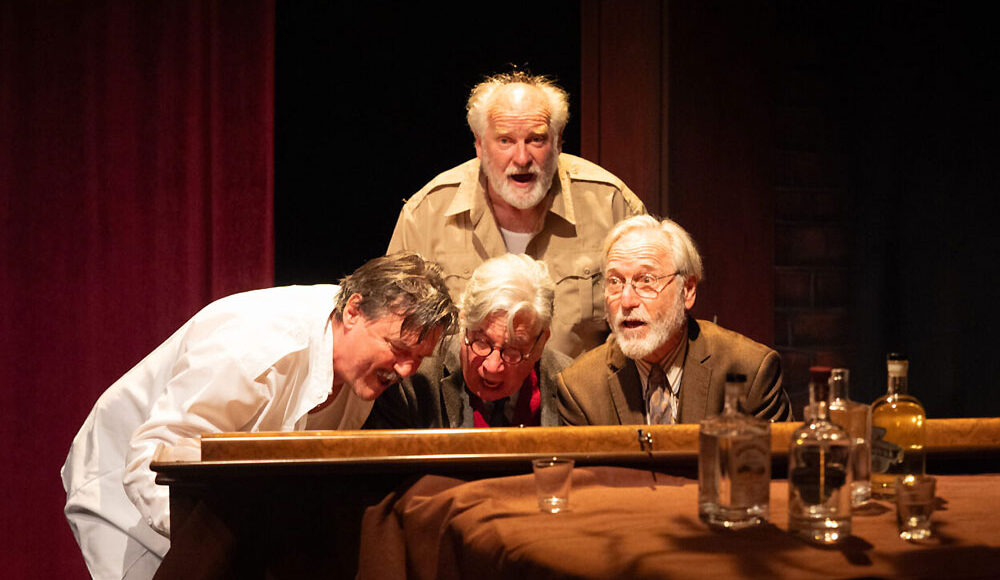“Music’s a good thing, it calms the beast in the man.”
Joseph Stalin
By Ernest Kearney — “A lot of trouble about a little music,” snarls Andrei Zhdanov (John Kayton) the Central Committee’s Chief of Ideology as he lords it over the two quivering souls before him.
It’s 1948, the Soviet Union has emerged from the “Great Patriotic War” victorious over Nazi Germany, if at the cost of 20 million of its citizens, and Russia is on the verge of the last murderous spasm of Joseph Stalin’s thirty year dictatorship.
In Stalin’s Master Class, running at the Odyssey Theatre Ensemble, British playwright David Pownall attempts to concentrate the chaos of that era within the confines of a Kremlin office; wherein two of the greatest composers of the 20th century Sergei Prokofiev (Jan Munroe) a master of all musical genres and the creator of the beloved Peter and the Wolf, and Dmitri Shostakovich (Randy Lowell) composer of operas, ballets and 15 symphonies, have been summoned by “the beloved leader and teacher, father of the nation, great Stalin (Ilia Volok.)”
The two men have fallen afoul of the Assembly of Soviet Composers, who have condemned their music for the sins of: “noisy improvisations,” “Cacophonic interventions,” “the piling up of ear-splitting harmonies, intentional illogicality and unemotionality.” Worse of all, they stand accused of “Formalism.”
In some ways the play is like an exorcism with Stalin the Priest come to drive the evil spirit of reactionary bourgeois subjectivism from the two men, but to the bellowing of Georgian folk songs not Tubular Bells.
Pownall’s work is an awkward beast.
The first act is a weave of exposition and posturing as Stalin arrives oozing a venomous charm filling the room with a miasma of menace. Shostakovich is aware at a performance of his opera Lady Macbeth of Mtsensk an obviously displeased Stalin had stormed out leaving the composer pale and weak-kneed. Having run out of politicians and generals to purge, Stalin had been turning to actors, filmmakers and musicians to face a show trial then execution.
Zhdanov and Stalin subject the artists to the Soviet version of “Bad Cop/Worse Cop.”
“We are loyal communists,” Prokofiev pleads.
“But you are not loyal composers,” snaps back Stalin.
With the hour-long first act almost functioning like an overture the success for any production of this work depends on a director’s craft to distract an audience from realizing the play actually begins after the intermission ends, and a cast who can make an audience feel the wait was worth it.
As usual, the Odyssey production delivers both. Munroe and Lowell capture the fraught sense of helplessness of two men trying to navigate a political tightrope of razor blades, and Kayton as Zhdanov, Stalin’s gruff whipping boy, shows us the cost of letting blind loyalty overcome one’s humanity.
Pownall keeps his stage sparse. Other than the merest tremor of resistance, slightest shudder of indignation, Pownall constrains these characters to the hapless playthings of Stalin. Which perhaps is all they could dare in the presence of one responsible for millions of deaths.
There are references to Stalin’s abusive childhood, his time in an orthodox seminary, and his ambitions to be a poet. These are like breadcrumbs left on a pathway, but breadcrumbs that go nowhere. In this play, all roads lead to Stalin himself.
As Stalin, Volok leads us down a rabbit hole more recognizable to Kafka than Alice, and in that realm, as in the Workers’ Paradise, Stalin is all; composer, librettist, knight, director, wolf, critic, redeemer, destroyer and as he proclaims, “the ultimate folk!”[1]
As Stalin’s ravings overwhelms and smothers all those in the room, Volok fills
the stage with his own presence to the point where he crowds the audience back into their seats.
Director Ron Sossi modulates, molds, magnifies, maps and manifests every moment like a true maestro. And a special nod goes to pianist Nisha Sue Arunasalam for providing the musical element worthy of Prokofiev and Shostakovich.
A good deal of history is left out of Stalin’s Master Class.
The Assembly of Soviet Composers issued their decree along Stalin’s instructions, among others, Shostakovich and Prokofiev were castigated as guilty for the “renunciation of the basic principles of classical music” and their works were banned.
Shostakovich lived in terror of the government coming for him in the middle of the night and would sleep with a packed suitcase ready for his exile to Siberia. To survive he wrote works that lavish praise on the state, but he also wrote music “for the drawer,” pieces that would not be heard until after Stalin’s death.
Prokofiev died March 5, 1953, the same day as Stalin. Thousands gathered to mourn Stalin. Thirty people attended Prokofiev’s funeral, Shostakovich was one.
Zhdanov’s death in August, 1948, caused Stalin to grow suspicious of Doctors, especially Jewish ones. 1952 saw the “Doctors’ Plot.” Stalin accused a number of Jewish doctors arrested and executed for complicity in Zhdanov’s “murder.” It’s been theorized Stalin’s own death was expedited by doctors of the nervous sort.
Pownall does succeed in his very specific objective, conveying the experience of the demonic domination of a despot. For as he has Stalin pronounce, “How do you wake people up to what’s been taken away from them?”
How indeed.
[1] Volok is a skilled “white rabbit,” having performed the same service in the Odyssey’s excellent production of Hanoch Levin’s Yaacobi & Leidetal in 2023.

***
For Tickets and Show Information Click HERE.





